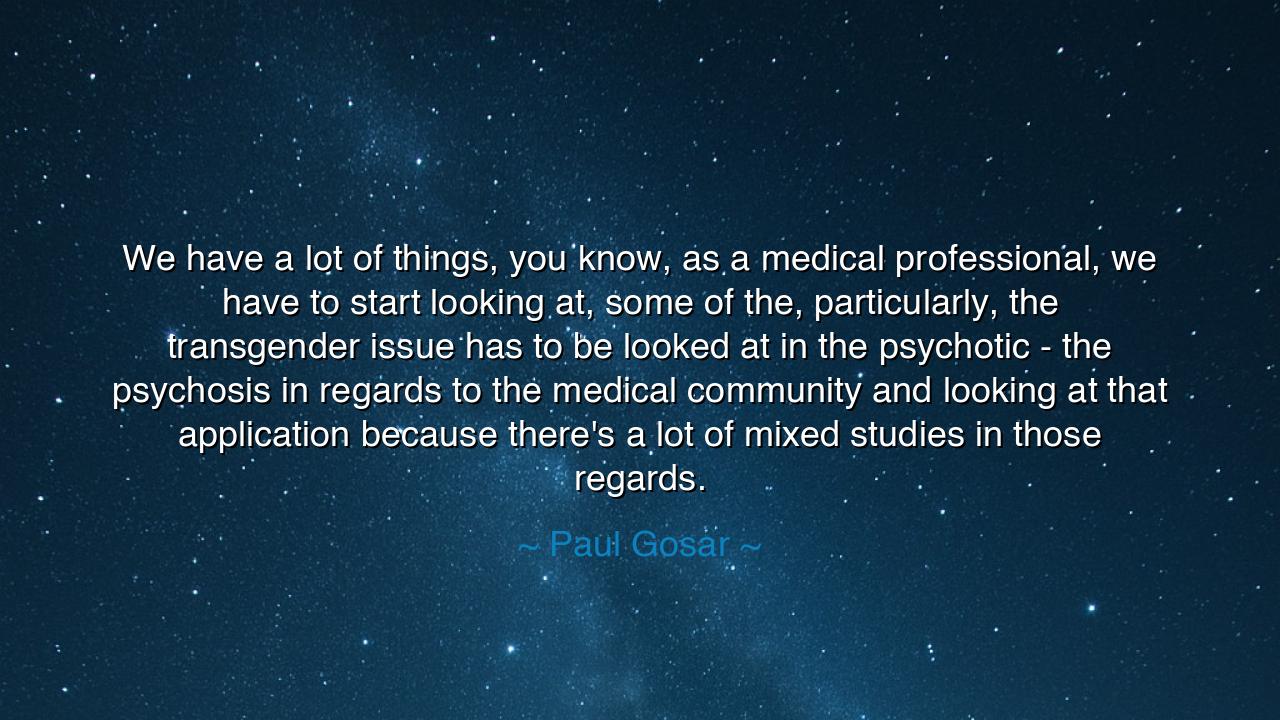
We have a lot of things, you know, as a medical professional, we
We have a lot of things, you know, as a medical professional, we have to start looking at, some of the, particularly, the transgender issue has to be looked at in the psychotic - the psychosis in regards to the medical community and looking at that application because there's a lot of mixed studies in those regards.






The words of Paul Gosar—“We have a lot of things, you know, as a medical professional, we have to start looking at, some of the, particularly, the transgender issue has to be looked at in the psychotic—the psychosis in regards to the medical community and looking at that application because there’s a lot of mixed studies in those regards.”—reflect the turmoil and questioning of an age standing at the crossroads of medicine, psychology, and identity. In his statement, Gosar does not speak with the certainty of dogma, but with the unease of a man gazing into the complexity of modern science and human experience. His words, though imperfectly framed, point toward a struggle that has accompanied humanity since its earliest days: the struggle to understand the mind, the soul, and the meaning of self.
In the ancient world, the physician was also philosopher. The medical professional was seen not only as a healer of the body, but as a seeker of truth within the human condition. From Hippocrates to Galen, from Avicenna to Paracelsus, those who bore the healer’s mantle sought to unite the physical and the spiritual. What Gosar’s quote reminds us—though wrapped in the language of a modern debate—is that medicine must always wrestle with the moral and metaphysical dimensions of its practice. The question of what it means to be healthy, whole, or human cannot be answered by data alone. There are, indeed, “mixed studies” because there are mixed hearts, mixed minds, and a world that still learns what it means to care.
His mention of the transgender issue and its relationship to the medical community touches one of the deepest and most sensitive questions of our era: how to reconcile the boundaries of biology with the vast spectrum of identity. In his phrasing lies the tension between medicine as a science of categorization and life as a force of self-definition. The ancients too grappled with this duality. The philosopher Heraclitus taught that “everything flows,” that identity is not fixed but constantly becoming. Yet in the same age, others sought order and division, believing that reason could name and define all things. Thus, even in modern times, we inherit their struggle: to balance understanding with humility, to study without judging, to explore without condemning.
The psychotic or psychosis that Gosar references—though controversially used—can be interpreted as a metaphor for confusion within the medical community itself. It is not necessarily a claim of madness among individuals, but a commentary on the fragmentation of understanding within the institutions of healing. In this sense, his words call attention to a truth all thinkers must face: when society moves faster than its science, when morality outruns comprehension, the result is a kind of collective bewilderment. The healer, like the philosopher, must then step back and reflect not only on the patient before him, but on the limits of his own knowledge.
Consider the example of Dr. John Snow, who in the 19th century sought to prove that cholera was spread through contaminated water, not through “miasma” or bad air. At the time, his ideas were dismissed by many learned men; the “medical community” itself resisted change. Yet Snow’s patience and evidence led to a revolution in public health. His story reminds us that progress often begins in confusion, that “mixed studies” are the seeds of eventual clarity. What Gosar speaks of, perhaps unknowingly, is the same timeless challenge: to discern truth from within contradiction, and to hold compassion even when certainty falters.
But there is also caution in his words—a warning, whether deliberate or not, about how easily fear and misunderstanding can masquerade as reason. In times of rapid social transformation, it is tempting for the medical professional or the leader to speak before listening, to interpret before understanding. The ancients would have called this hubris, the overreach of intellect beyond wisdom. True medicine, however, does not seek control—it seeks balance. It listens as much as it diagnoses, and it heals as much through empathy as through science. Thus, whether one agrees with Gosar’s framing or not, his quote compels us to ask: are we, as a civilization, listening deeply enough to one another?
So, my child of thought, take this lesson as your own: when confronted with controversy, seek not to win the argument but to understand the truth. Let your heart be as disciplined as your mind. If you are a scholar, study with humility; if you are a healer, treat with compassion; if you are a citizen, judge with mercy. The questions that divide humanity are often the very ones that can unite it—if approached with honesty and grace.
For in the end, Paul Gosar’s words, though tangled in the thorns of modern debate, whisper an ancient message: that medicine and morality must forever walk hand in hand. The healer must examine not only the illness of the body, but the confusion of the age, and strive always toward clarity without cruelty, toward knowledge without arrogance. The wise know that understanding is not born from certainty but from courage—the courage to question, to listen, and to love even in the midst of discord.






AAdministratorAdministrator
Welcome, honored guests. Please leave a comment, we will respond soon